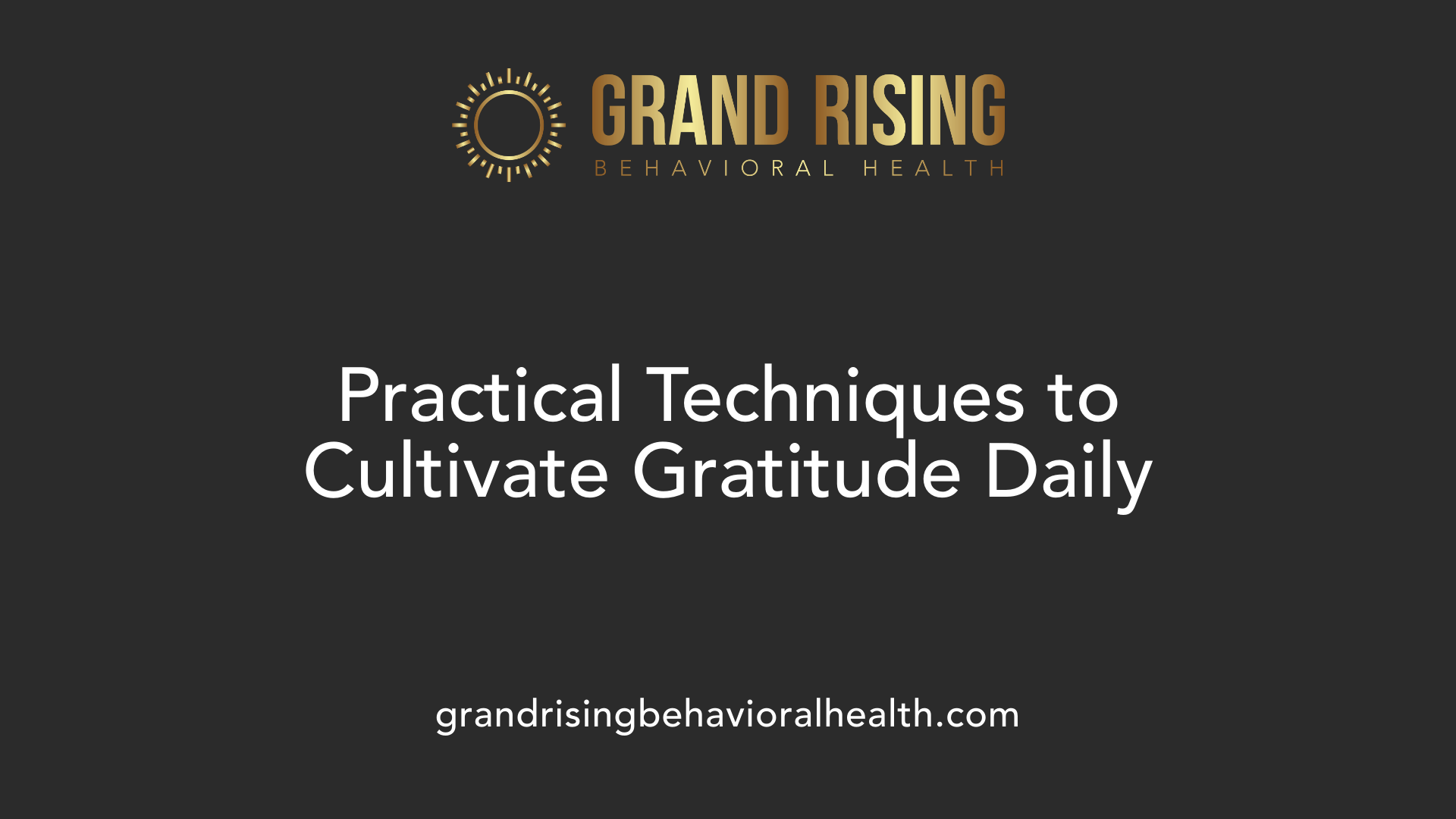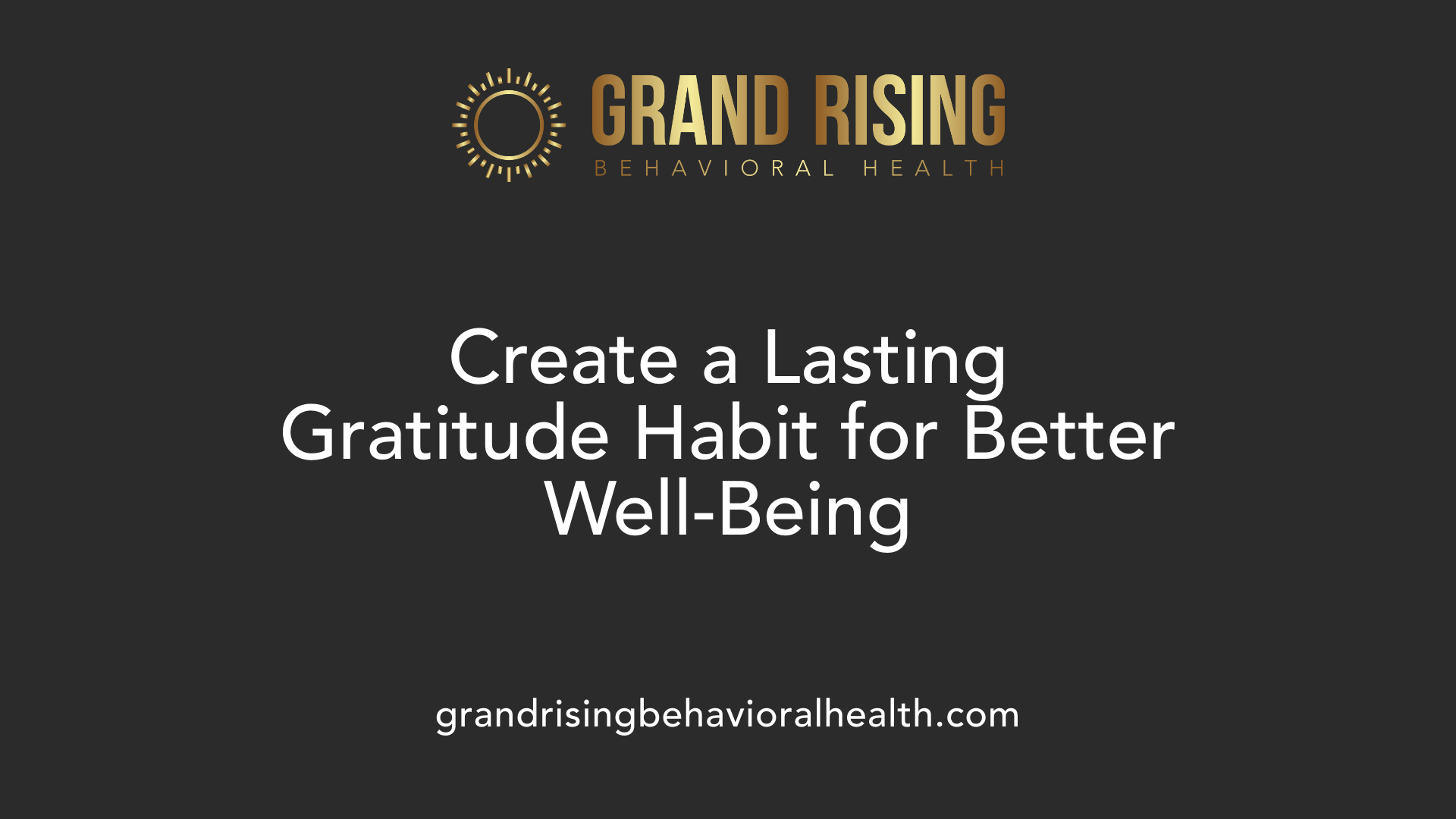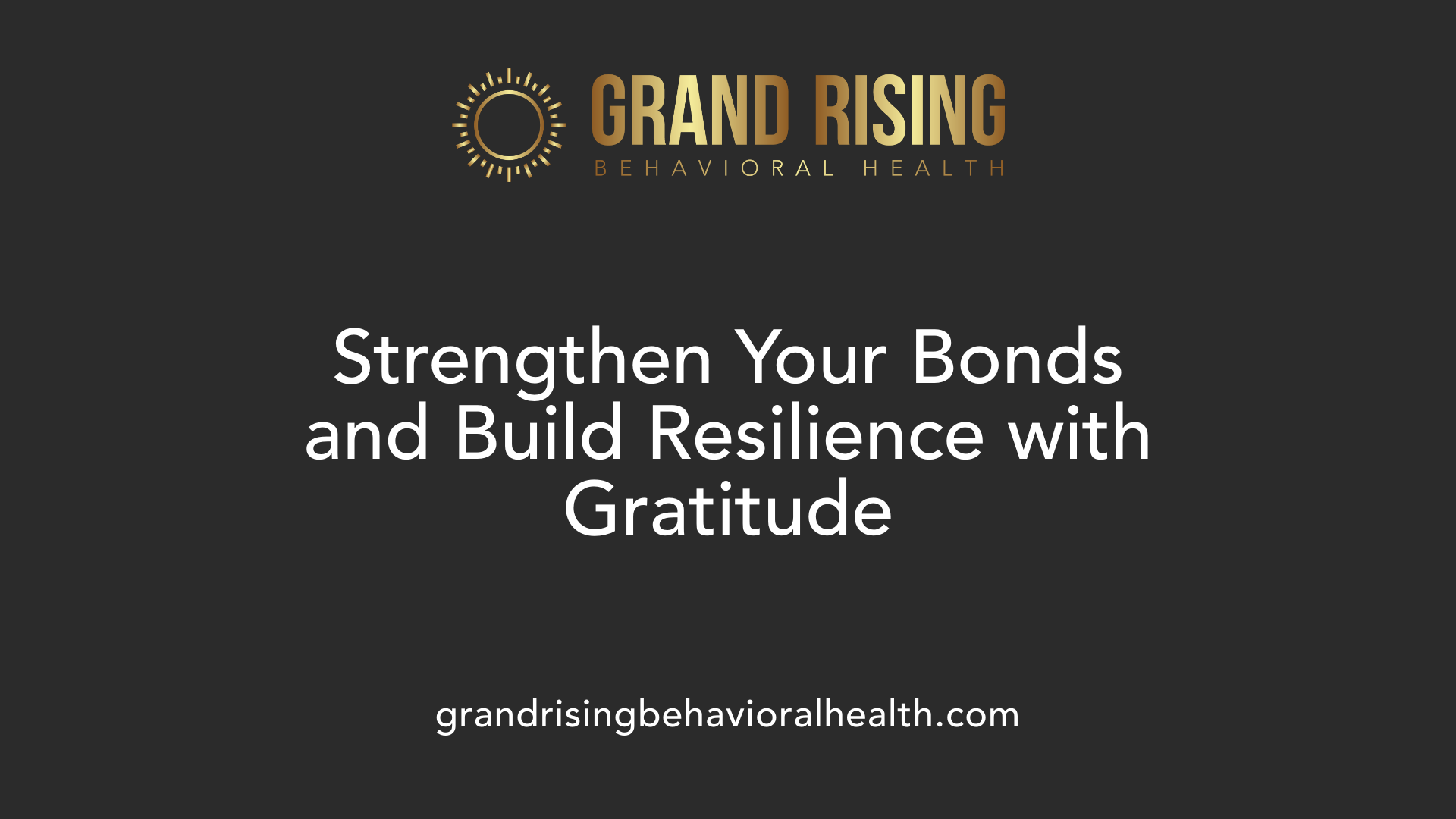How to Practice Gratitude for Better Mental Health
Unlock the Power of Gratitude to Boost Your Mental Well-being

Harnessing Gratitude for Mental Health Improvement
Practicing gratitude is a simple yet profound way to enhance mental health, increase resilience, and foster stronger relationships. By actively recognizing and appreciating the positive aspects of life, individuals can combat negative thought patterns, reduce stress, and promote overall well-being. This article explores effective techniques, scientific insights, and practical strategies to incorporate gratitude into daily life for better mental health outcomes.
Effective Ways to Practice Gratitude for Mental Health Benefits

What are some effective ways to practice gratitude for mental health benefits?
Practicing gratitude regularly can have a profound impact on mental and physical health. One of the most accessible methods is maintaining a gratitude journal. By dedicating a few minutes each day to jot down what you are thankful for—whether it’s a kind word, a beautiful sunset, or a moment of peace—you can enhance your mood and build emotional resilience.
Writing gratitude letters or thank-you notes is another powerful approach. This practice not only fosters feelings of appreciation but also strengthens social bonds, which are crucial for mental well-being. Expressing thanks to others, whether through a handwritten letter or a simple verbal acknowledgment, can deepen relationships and generate positive emotions.
Incorporating mindfulness into gratitude practices through meditation or reflective exercises enhances the benefits. Gratitude meditation involves focusing your attention on things you appreciate, helping to quiet negative thoughts and promote emotional balance. Regular mindfulness and gratitude reflections create a mental space that encourages positivity and reduces stress.
Another practical tool is using visual aids such as gratitude jars or creating visual gratitude trees. Writing positive experiences or blessings on notes and placing them in a jar allows for quick reflection during tough times. Similarly, gratitude walks—simply taking a walk while consciously noticing what you’re thankful for—can boost emotional health.
Adding acts of kindness, like volunteering or giving small gifts, complements your gratitude practice. Helping others not only promotes social connection but also builds a sense of purpose and satisfaction.
Combining these practices consistently helps to rewire brain pathways linked to happiness and social bonding. By integrating activities like journaling, mindful reflection, and acts of kindness into daily routines, individuals can reduce stress, improve their outlook, and foster a more positive mental state.
Developing and Sustaining a Gratitude Practice
 Starting a gratitude practice is a simple yet effective way to boost overall well-being. One of the most practical methods is keeping a gratitude journal. Each day, set aside a specific time—such as in the morning or before bed—to write down three to five things you are thankful for. These can be small, everyday moments like a warm cup of coffee, or bigger blessings like family or health.
Starting a gratitude practice is a simple yet effective way to boost overall well-being. One of the most practical methods is keeping a gratitude journal. Each day, set aside a specific time—such as in the morning or before bed—to write down three to five things you are thankful for. These can be small, everyday moments like a warm cup of coffee, or bigger blessings like family or health.
Varying your gratitude exercises helps keep the practice fresh and engaging. For example, you can write thank-you notes to friends or family, directly expressing your appreciation. Practicing gratitude meditation by focusing on things you are grateful for can reduce negative thoughts and enhance mindfulness.
Sharing your gratitude with others can deepen your experience. Talking about what you are thankful for strengthens relationships and fosters positive connections. Consider telling someone how much they mean to you or expressing appreciation openly.
Using visual cues also supports habit formation. Place sticky notes with gratitude affirmations around your home or set daily reminders on your phone to pause and reflect. Creating a gratitude jar—writing blessings on slips of paper and collecting them—serves as a visual reminder of positive moments.
Incorporate gratitude routines into your day. For example, pause during meals to appreciate your food, or take a moment before sleep to reflect on the good parts of your day. Scientific research shows that these practices can not only improve mental health by increasing positive emotions but also bolster physical health, including better sleep and lower stress hormones.
By intentionally integrating these activities into your daily life, you nurture a resilient, optimistic outlook. Remember, the key is consistency; regular practice transforms gratitude from a fleeting feeling into a lasting habit that benefits your mind, body, and relationships.
Impacts of Gratitude on Emotional, Psychological, and Physical Health
 Practicing gratitude offers a multitude of benefits for emotional, mental, and physical health. It boosts positive emotions such as happiness, contentment, and optimism, which enhances overall life satisfaction. Regular gratitude exercises can help reduce symptoms of anxiety and depression by shifting focus away from negative thought patterns like rumination and catastrophizing. This mental shift fosters resilience, making individuals better equipped to handle stress and adversity.
Practicing gratitude offers a multitude of benefits for emotional, mental, and physical health. It boosts positive emotions such as happiness, contentment, and optimism, which enhances overall life satisfaction. Regular gratitude exercises can help reduce symptoms of anxiety and depression by shifting focus away from negative thought patterns like rumination and catastrophizing. This mental shift fosters resilience, making individuals better equipped to handle stress and adversity.
On a neurochemical level, gratitude promotes the release of neurotransmitters like serotonin and dopamine, which are vital for mood regulation. It also activates brain regions such as the hippocampus and prefrontal cortex, aiding in emotional regulation. Physically, gratitude has been linked to reduced stress hormones like cortisol, lower inflammation, improved immune function, and better sleep quality. These physiological changes contribute to overall health and may even extend lifespan.
Beyond mental health, gratitude fosters healthier behaviors and stronger social connections. Expressing appreciation enhances relationships, cultivating trust, empathy, and support. This social bonding not only improves psychological well-being but also encourages behaviors conducive to physical wellness, such as regular exercise and healthier lifestyle choices.
Research provides evidence that gratitude is associated with lower risk of mortality and longer life expectancy. For example, a large study in 2024 found that individuals with higher gratitude scores had a 9% reduced risk of death over four years. The cumulative effect of these mental, emotional, and physical benefits underscores the importance of cultivating gratitude as a holistic approach to health. Incorporating simple practices like journaling, mindful reflection, or expressing thanks can serve as powerful tools to enhance well-being across all life domains.
Enhancing Relationships and Building Emotional Resilience through Gratitude

How does gratitude enhance relationships and emotional resilience?
Practicing gratitude significantly impacts both our social connections and our ability to bounce back from life's challenges. When we actively recognize and appreciate the good in others, it fosters a sense of appreciation, kindness, and empathy. These positive emotions strengthen social bonds and create a foundation of trust, encouraging acts of generosity and helping behaviors.
Gratitude also reduces toxic feelings such as envy, jealousy, and resentment by shifting our focus from what we lack to what we have. This shift nurtures a more harmonious environment within relationships, promoting mutual understanding and respect.
On an individual level, gratitude enhances emotional resilience by redirecting attention toward positive aspects of life even amidst adversity. This mental shift helps manage stress effectively and cope with negative emotions, building inner strength.
Furthermore, expressing gratitude is linked to physical health benefits like lower blood pressure, stronger immune response, and improved sleep—factors that furtherupport emotional well-being.
Overall, cultivatng gratitude leads to healthier, more connected relationships and aids in developing resilience, making it easier to handle life's inevitable ups and downs.
Scientific Foundations Supporting Gratitude’s Benefits on Mental Health

What scientific research supports the positive effects of gratitude on mental health?
A growing body of scientific research demonstrates that practicing gratitude offers substantial mental health benefits. Multiple studies and meta-analyses have shown that engaging in gratitude exercises can lead to immediate reductions in anxiety and depression symptoms, often by as much as 35% within a few weeks. For example, systematic reviews of randomized control trials reveal consistent evidence that gratitude interventions, such as journaling or writing thank-you letters, boost positive emotions and foster a more optimistic outlook.
Longitudinal research further underscores these benefits, with large-scale studies like the Nurses' Health Study indicating that individuals with higher gratitude levels tend to have longer, healthier lives. Such studies have identified correlations between regular gratitude practice and lower risks of mental health conditions as well as overall mortality.
Moreover, gratitude's impact on mental well-being is supported by brain research. Practicing gratitude activates neurochemical pathways that increase the release of happiness-associated neurotransmitters like serotonin and dopamine. It also fosters neural connectivity associated with resilience and social bonding.
The scientific evidence collectively presents a compelling case: consistent gratitude practice not only alleviates symptoms of mental distress but also enhances emotional resilience and physical health, making it a valuable component in mental health strategies.
Embracing Gratitude for a Healthier Future
Incorporating regular gratitude practices into daily life offers substantial benefits for mental, emotional, and physical well-being. From simple activities like journaling and expressing thanks to deeper techniques such as mindfulness and shared appreciation, cultivating gratitude can combat negativity, foster resilience, improve relationships, and support overall health. Backed by scientific research, these practices are accessible and effective tools to foster a more positive outlook and a healthier, more connected life. Embrace gratitude today to unlock its transformative power and pave the way for a happier, more resilient future.
References
- Gratitude - A Mental Health Game Changer
- Gratitude: The Benefits and How to Practice It - HelpGuide.org
- The Importance of Practicing Gratitude and Celebrating Small Victories
- How to Practice Gratitude - Mindful.org
- How to Practice Gratitude for Better Mental Health
- Practicing Gratitude for Better Health and Well-Being
- 20 Gratitude Exercises & Activities to Boost Wellbeing
- How to Practice Gratitude - The Jed Foundation
- The Impact of Gratitude on Mental Health - NAMI California
More Resources
A team ready to start your journey.
Get in touch — today.
We are a safe space – a haven for exceptional individuals to receive discreet, personalized, in-person treatment and care.
.avif)










